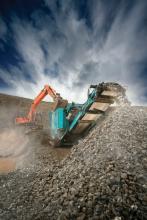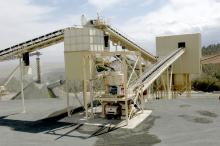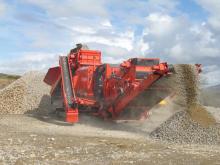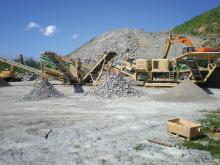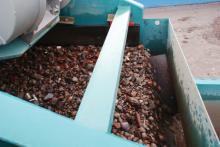
Calls for more flexible screening solutions and easier financing are helping to drive demand for mobile units. Claire Symes reports
Accurate screening is essential to ensure quarry products meet the ever tightening aggregate specifications in Europe and command the highest price in the market. But restrictions of capital investment over the last 18 months have made it difficult for quarries to upgrade their operations.
Financing problems have helped to accelerate the trend towards mobile screening equipment as banks view it as a saleable asset, while quarry operators like the ability to move equipment with changing demand. These changes in the dynamics of the market are also influencing the type of mobile screens that are being bought for European quarries.
"We are noticing that scalpers are growing in popularity," said Maximus sales manager Barry O'Neil. "This could be because they are more diverse in their capabilities due to having an aggressive box that can cope with a wide range of aggregate sizes." He also added that the company was working on a new triple deck screen as many customers want to get more products from one machine and find this easier to finance.
"The main change we are seeing is that customers want an ever bigger screening area but in a machine that it is still possible to transport. They have seen developments in mobile crushers enable mobile equipment to directly compete with fixed units and now they want the same from screening equipment. It is possible to make larger machines but keeping them within transport dimensions is a challenge." According to a spokesman at
"The changes in capital investment are also leading to development of the rental market. In the US, the market has long been largely a rent to buy business where the quarry will rent the screen for four to six months before buying it outright. This way the quarry can be sure that the screen suits its needs with proven capability. However, in Europe - with the exception of France - rental of screen has been very limited but that is changing, especially in Eastern Europe and I think this area of the market will grow.
"Another trend that is driving development is the need for alternative power solutions. Customers want duel power so that machines can be used on any site. This option is also ideal for the rental market."
Developing technology
According to Brian, there is a definite growing demand for bigger screens. "This is coming in combination with calls for crushing and screening equipment to 'talk' to each other more," he said. "We are trying to develop products using the same electronics and operating systems to simplify use on site but this allows for better integration. Such communication means that the crusher can be stopped automatically if there is a problem with the screen and vice versa." Wood has also seen the increased demand for automation. "Our mobile equipment already contains the necessary electronics to allow connection by cable to allow the whole system to work automatically," he said. "More customers are investing in the cables to do this but we are working on a remote system that will remove the need for cables. Field tests are expected to start soon and we hope to bring it to market in the next 12 to 18 months." Other trends that are driving development is the need for alternative power solutions. Many quarry customers now want duel power so that machines can be used on any site - this option is also ideal for the rental market.
"When it comes to new technology there is an opportunity to develop more modular machines that can be upgraded as a customers' business grows," said Brian. "By using a standard chassis and common parts and components across product ranges, it could be possible for quarry operators to boost capacity or add capabilities by fitting a larger screen box or a washing module, rather than needing to invest in a complete new machine. This would also be easier for investment." However, when it comes to radical changes in mobile screen design, Brian said, "I don't expect to see any broad changes to technology."

